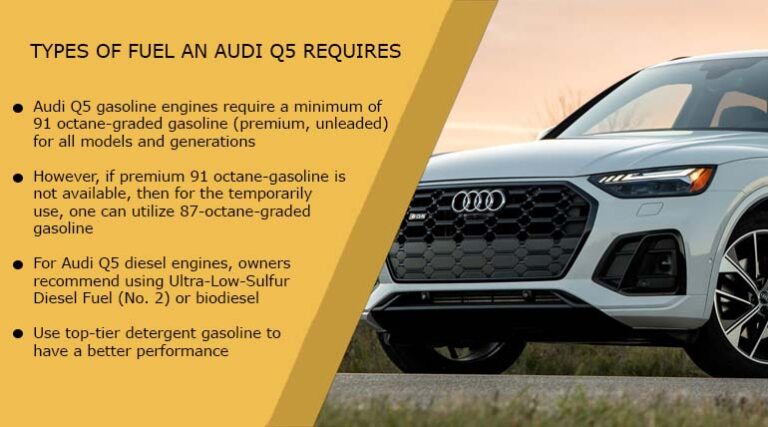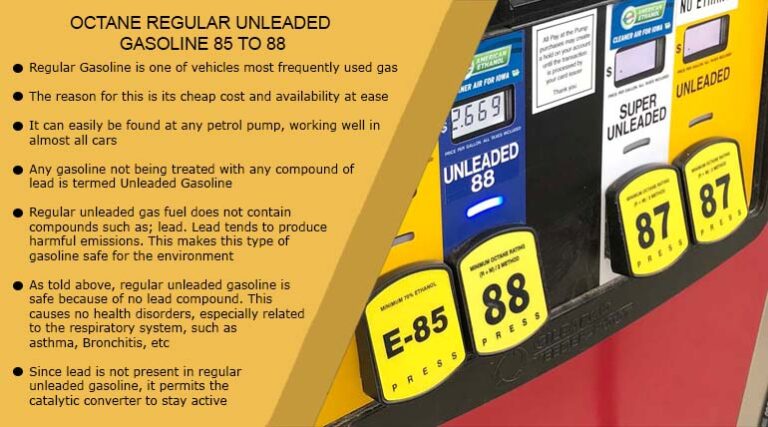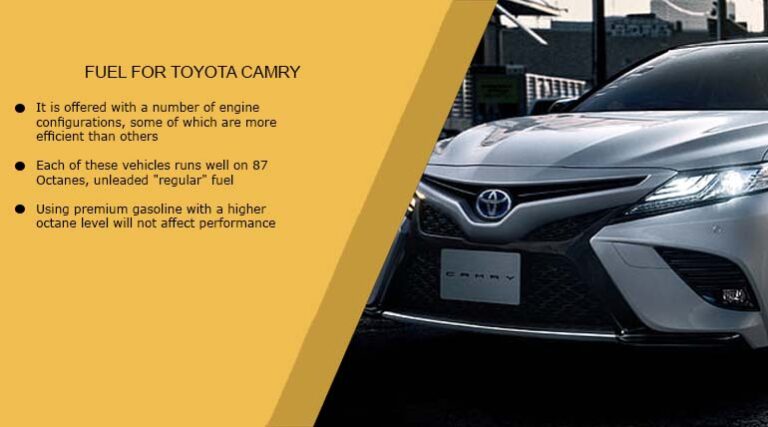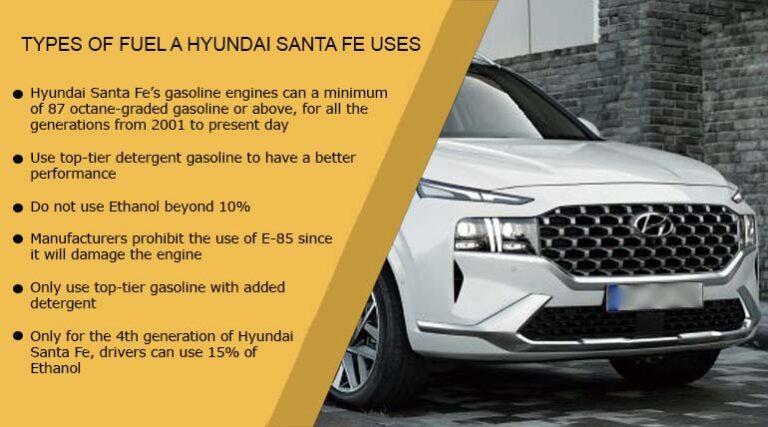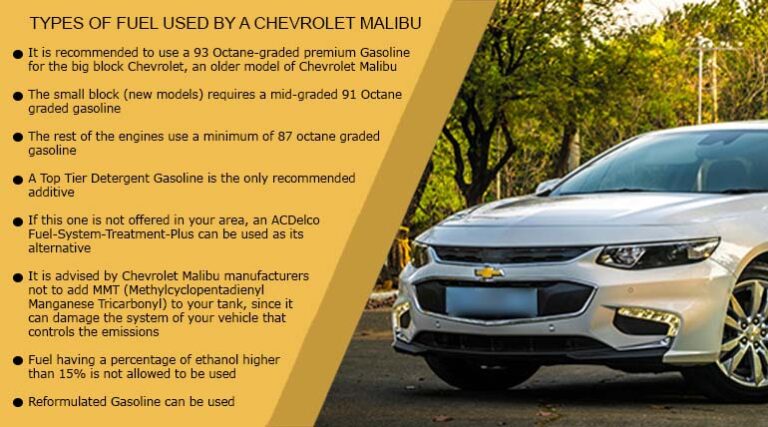Types of Fuel A Chevrolet Cruze Takes – All You Need To Know!
This piece will cover in-depth the exact types of fuel a Chevrolet Cruze takes to function well. We will sort out all your queries and confusion regarding other possible fuel variations available in the market for your Chevy Cruze.
However, before we move into the details, let’s first concisely introduce the Chevrolet Cruze to its potential buyers, shall we?
Introduction to Chevy Cruze
General Motor Company manufactured this amazing automobile, Chevrolet Cruze, a compact vehicle, back in 2008. It is a four-door compact Sedan, and later a five-door hatch-back variant, from the year 2011. It has total of two generations. Its layout includes a front-wheel drive and a front engine.
Let’s go through a brief summary of this article regarding the correct types of fuel for a Chevrolet Cruze, before jumping into the details;
To summarize, Chevrolet Cruze’s gasoline engines can function well on a minimum of 87 octane-graded gasoline or above 87 (Regular, unleaded) for all the models from the year 2011 to 2019. For Chevy Cruze’s diesel engines, owners recommend using Ultra-Low-Sulfur Diesel Fuel (not beyond 15 ppm) or biodiesel (less than 20%). Use top-tier detergent gasoline to have a better performance, and Ethanol up to 15%.
Related article: Types Of Fuel Chevrolet Silverado Uses (Explained)
Types of Gasoline A Chevrolet Cruze Takes (All Model Years)
However, by using the databases of the manufacturers, forums, and reviews of people around the globe driving an Chevrolet Cruze, all the data here concerning the correct types of fuel for your Chevrolet Cruze (gasoline or diesel), according to its two generations and their corresponding engines, is well-researched and collected to assist you so that you can enjoy fully out of your vehicle. Let’s begin!
The Chevrolet Cruze –Model Years- 2011 to 2016
The Chevrolet Cruze model years 2011 to 2016 function well on a minimum of 87 octane-graded gasoline (Regular, unleaded) or higher, but at least 87 Octane. These models come under the first generation of Chevrolet Cruze. For Chevy Cruze’s diesel engine 2.0 L Turbo Diesel, owners recommend using Ultra-Low-Sulfur Diesel Fuel (not beyond 15 ppm) or biodiesel (less than 20%).
Following are the engines these model years offer;
- 1.4 L (turbo and regular)
- 1.6 L
- 1.8L
- 2.0 L Turbo (diesel)
The Chevrolet Cruze –Model Years- 2016 to 2019
The Chevrolet Cruze model years 2016 to 2019 function well on a minimum of 87 octane-graded gasoline (Regular, unleaded) or higher, but at least 87 Octane. These models come under the second generation of Chevrolet Cruze. For Chevy Cruze’s diesel engine 1.6 L Turbo Diesel, owners recommend using Ultra-Low-Sulfur Diesel Fuel (not beyond 15 ppm) or biodiesel (less than 20%).
Following are the engines these model years offer;
- 1.4 L (turbo)
- 1.6 L (diesel)
Diversity of Fuel Other Than Conventional Gasoline
Which Other Varieties of Fuel Are Compatible With Chevrolet Cruze?
Today, we have various automobile fuel options, from Reformulated Fuel (RFG) to different additives and blends. But the question is, are they even compatible with a Chevrolet Cruze? Are they effective?
We will address this question quickly in the below section of this article, so Hang On!
Gasoline Comprising Methylcyclopentadienyl Manganese Tricarbonyl (MMT)
It is suggested by the manufacturers of the Chevrolet Cruze not to add any additive based on Manganese since it can damage the system of your vehicle that controls the emissions. If it is used in vehicles that are not recommended, it can lead to much harm.
Gasoline comprising Methylcyclopentadienyl Manganese Tricarbonyl (MMT) was used to improve the poor quality octane of fuel and seize the knocking noise produced by engines back then. The same case is with the MTBEs.
Biodiesels
Biodiesel oils are very nature friendly since they are soyabean oil derivatives. Canola and yellow grease are the sources and are biodegradable. Although biodiesel oils are very nature friendly since they are derived from cooking oil (wasted), vegetable, and soybean oils, through a process called “Trans-esterification.”
Chevrolet Cruze manufactures allow usual diesel mixed with only 20 % of biodiesel. Beyond 20 % causes debris and clogging up of the filters. To avoid this issue, keep on changing the filters of the oil consistently.
Reformulated Gasoline Fuel (RFG)
Indeed, Chevrolet Cruze experienced drivers recommend using RFG whenever available over a non-reformulated gasoline fuel. It is also best recommended for the area having smog at a higher concentration to decrease air pollution.
For cleaner and greener burning, and with a nature-friendly impact, Reformulated Gasoline (RFG) is produced, which causes reduced smog, and less toxic pollutants than regular gasoline, having no negative impacts. It is said to increase the miles per gas number of your vehicle.
Chevrolet Cruze Manufacturer’s Suggested Fuel
Chevrolet Cruze owners recommend using Top-tier detergent gasoline, which keeps the engines clean and away from debris. Use a minimum of 87 octane-graded gasoline (Regular, unleaded). For Chevy Cruze diesel engines, owners recommend using Ultra-Low-Sulfur Diesel Fuel (not beyond 15 ppm) or biodiesel (less than 20%).
Gasoline/Oxygenated Blends for Chevrolet Cruze
Chevrolet Cruze can function on oxygenated blends. They burn more efficiently and cleanly. Chevrolet Cruze manufacturers recommend using 15% ethanol (E-15). Ethanol percentage beyond 15% is very dangerous and prohibited. Ethanol-10 (E-10) is also compatible with Chevrolet Cruze gasoline engine.
Gasoline with Added Cleaning Agents
To keep your engine clean, safe, and up to the standards of emission, TOP-TIER detergent gasoline is highly recommended for Chevrolet Cruze.
It is suggested that the Chevrolet Cruze should utilize a gas mixed with a large concentration of agents used for cleaning. Cleaning agents such as; additives are recommended so that your vehicle remains safe from deposits and debris and to keep your vehicle’s engine free from the excessive buildup of Carbon in the valves and injectors.
These are readily available with your nearest top-tier retailers. These cleaning additives increase the performance of your car.
Prohibited Additives
Additives prohibited by Chevrolet Cruze manufacturers include;
- Solvents
- Methanol
- Silicon
- Any metal-based ones
- Kerosene
- Additives based on metals
You can read: Types of Fuel Used By a Chevrolet Malibu; Everything You Need To Know!
Most Recurrently Asked Questions about the Chevrolet Cruze!
“My Cruze Engine Knocks Afterwards Refilling”- What Does It Indicate?
If you put a lower than 87 octane-rated gasoline in your Chevrolet Cruze, it degrades the performance and economy of the engine. Gasoline will burn prematurely if one puts a lower-octane gas in a machine with higher compression. It causes an unsmooth burn and engine knock.
Hence, it is highly crucial to use the correct gasoline fuel with the right octane grading.
If you hear a fainted-knocking sound from your Chevrolet Cruze engine, it indicates no danger. But if you hear a loud knocking sound from your engine, it is due to the usage of a lower quality and lower octane gasoline.
How Can I Reduce “Knocking Noise” from My Chevrolet Cruze Engine?
To reduce the knocking-like noise in your Chevrolet Cruze, fill up your tank with a recommended minimum of 87 Octane-graded gasoline or a mid-graded 91-octane gasoline or greater. Use at most 87 octane-graded gasoline.
Can All the Generations of Chevrolet Cruze Consume RFGs as Fuel?
You must be pondering if all generations of Chevrolet Cruze are suitable for using Reformulation Gasoline Fuel, so the answer to this is YES!
RFG has also been compulsory for almost nineteen states and regions in the United States of America to use less toxic fuel to protect the quality of air.
How to Locate a Flex-Fuel Vehicle?
Following are the ways to locate a flex-fuel engine in your vehicle;
- A yellow bezel surrounding the inlet of the fuel tank indicates that your vehicle is flex-fuel. If you are unable to find it there, then you can check out the door of your fuel tank as well.
- However, Chevrolet Cruze manufacturers do not allow it to run the engine on an E-85, even if it is flex-fuel.
Chevrolet Cruze Drivers’ Reviews – Regular or Premium Gasoline, Which One Do They Recommend?
After leading revisions from various forums and reviews of the people using Chevrolet Cruze globally, the conclusion is that; the regular, unleaded gasoline with 87 Octane-rating has proved to work well for them, for all the generations and model years of Chevrolet Cruze.
Similarly, several drivers say they feel no obvious difference, while others say; they do feel an obvious difference and recommend using the premium one (91) because it improves the mpg of their vehicle. Some also considered the cost; since the premium ones are a bit more expensive than the regular, unleaded ones, they stick around the 87 Octane-graded ones.
What is the Importance of Using the Correct Fuel Type for a Chevrolet Cruze?
However, now the query arises, why is it important to know the correct type of fuel for your Chevrolet Cruze? The response to this is simple; to guard your engine against damage and accidents of fire and to keep your warranty away from being void.
Conclusion
To conclude, General Motor Company manufactured this amazing automobile, Chevrolet Cruze, a compact vehicle, back in 2008. It is a four-door compact Sedan, and later a five-door hatch-back variant, from the year 2011.
It has total of two generations. Its layout includes a front-wheel drive and a front engine.
About the types of fuel a Chevrolet Cruze gasoline engines can function well on a minimum of 87 octane-graded gasoline or above 87 (Regular, unleaded) for all the models from the year 2011 to 2019.
For Chevy Cruze’s diesel engines, owners recommend using Ultra-Low-Sulfur Diesel Fuel (not beyond 15 ppm) or biodiesel (less than 20%). Use top-tier detergent gasoline to have a better performance, and Ethanol up to 15%.


